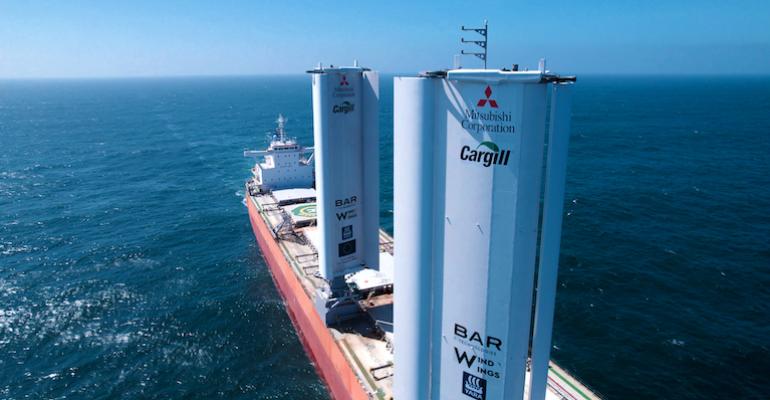Commodities shipper Cargill, in partnership with BAR Tech, Mitsubishi and Yara Marine Technologies has announced the first ship fitted with WindWings has set sail for Brazil out of China.
Mitsubishi Corporations’ Pyxis Ocean, which was built in 2017 and is on charter to Cargill, has been retrofitted with two 37.5m wing sails designed by BAR Tech and produced by Yara. The sails are expected to reduce carbon emissions by up to 30% on average.
Pyxis Ocean is the first ship to sail with WindWings fitted but it is being followed closely by the first Newcastlemax, the 210,000 dwt Berge Olympus, owned by Singapore-based company Berge Bulk, which is having its four WindWings fitted now and is expected to be out of the dock this month, BAR Tech CEO John Cooper told Seatrade Maritime News.
By the time that Berge Olympus leaves the dock, VesselsValue AIS predicts that Pyxis Ocean, which is travelling, under ballast, will be more than half way to Paranagua in Brazil, where it is due to arrive in mid-September, following the completion of sea trials in early August.
According to Jan Dieleman, President of Cargill’s Ocean transportation business, Cargill has a “responsibility” to decarbonise its supply chains.
He also pointed out that, “A technology like WindWings doesn’t come without risk, and as an industry leader – in partnership with visionary shipowner Mitsubishi Corporation - we are not afraid to invest, take those risks and be transparent with our learnings to help our partners in maritime transition to a more sustainable future.”
A partnership of a vessel operator with a designer, production company and shipper, with funding from the EU’s Horizon programme came together in 2019, when Cargill called BAR Tech asking them to design a system to cut emissions.
Kohei Yamashita GM, Ship Department, Mitsubishi Corporation said the “Pyxis Ocean project is a huge achievement on its own, which makes me very excited, but I’m even more excited when I think of its potential in the future.“
Yamashita added: “Although there are so many energy saving devices in the market today, wind assisted propulsion systems is one of the very few solutions available that can achieve fuel savings by two digits.”
That is an important point, because as Dieleman points out, “This technology uses a free fuel,” which means all the operational savings will reduce costs directly, as well as emissions.
Moreover, with HFO currently standing at around $580 per tonne and the introduction of carbon pricing in Europe, in January expected to be followed by similar schemes, and with the cost of green fuels is expected to be higher, the eventual savings could be very hard to ignore.
“This is not just a nice project,” argued Dieleman, “this is an extremely important project for the [maritime] industry to move forward.
Cooper explained that WindWings has three main sail components, the 10m wide main sail with a 5m wide front and rear elements of the sails. “The sails are computer controlled, so no crew involvement necessary,” he said.
“These elements work together, each has a central pivot and the whole wing also rotates such that we can present that wing in many different angles, in many different formats depending on the wind angle and wind speed,” explained Cooper.

Manufactured using the same steel used to build ships, D32 and D36 along with a composite glass material, “similar to that used in wind turbine propellers,” explained Cooper, the sails can be lowered for cargo operations, while Cooper also said it is recommended that the sails are lowered in winds greater than 50 knots.
Each WindWing will save 1.5 tonnes of fuel a day, 3 tonnes of savings per day for the operation of the Pyxis Ocean on average. If the vessel burns 50 tonnes of HFO daily that could amount to around $2,000 in savings for Pyxis Ocean. “That’s next level savings,” said Cooper.
“We hope to gain a lot of insight from Pyxis Ocean, which would open the doors to an extended application to other ships in our existing fleet,” concluded Yamashita.
Copyright © 2024. All rights reserved. Seatrade, a trading name of Informa Markets (UK) Limited.
Add Seatrade Maritime News to your Google News feed.  |

